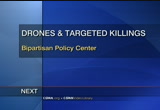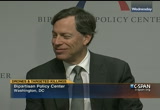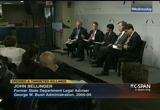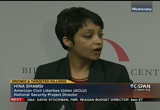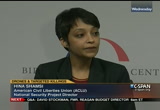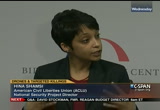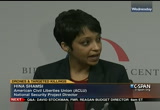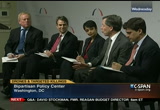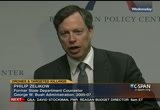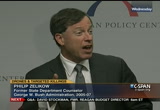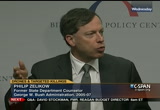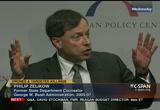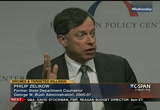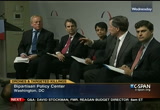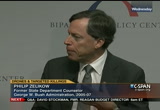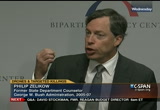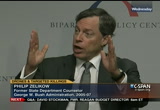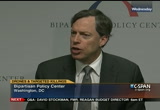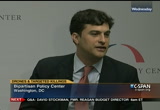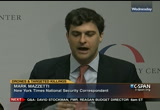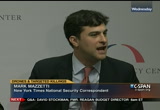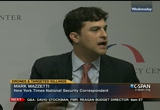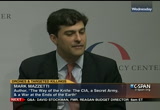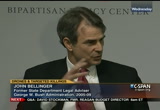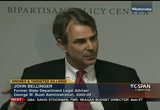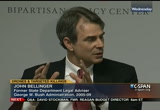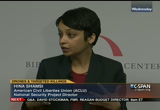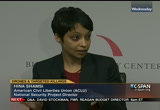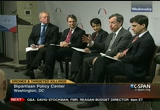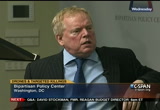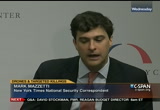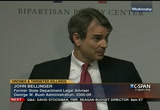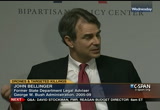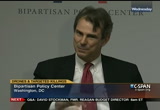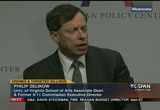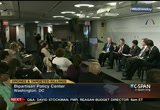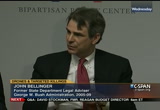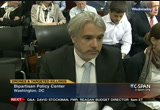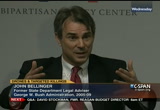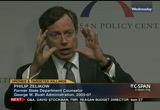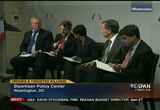tv Use of Drones CSPAN May 6, 2013 4:50am-6:01am EDT
5:00 am
in a moment i would be happy to get into the legal details. but that is where we are right now. >> thanks, john. hina? >> thank you, mike. and thank you to the bipartisan policy center for having this event and for inviting me. the spirit ofn the center with agreeing with a lot of what john bellinger has said. targeted killings program rate is profoundly important legal and moral policy question. right now the public debate, with respect to those questions is crippled, because we don't actually have a lot of the information we need in order to determine the full extent of where the program is being carried out, how , against whom, with what investigation, and what measures to prevent harm to
5:01 am
civilians. let me also start with another point of agreement. often a straw man is created. the idea that people are against drones. some people may be. as a legal matter, i don't think drones are unlawful, but as a policy matter, they raise profoundly important question, because they are easier to use without risk to u.s. forces and may be able to be used in places where we are not otherwise at war, as has been explained to the american public where we are at war. it becomes a legal issue when you tell about who is using drones. it has been widely reported that the cia and is using drones. the cia drone
5:02 am
program is secret is one of the worst kept secrets in the world. it's undermined by a legitimacy to make that claim. but it takes us to the question of how are we using this weapon or any other weapon? helicopter airships have also been used to carry out the program of targeted killing. that is the heart of the debate. know is deeply troubling. i think there is general agreement among its international law scholars that the use of lethal force is permissible under international law, and human-rights law, in response to a specific concrete and imminent threat. in the law of war context, when you are in an armed conflict, it would be permissible against civilians who are directly participating in hostilities, as those terms are defined under
5:03 am
the laws of war and as long as other requirements are met. what has been made public in speeches by administration officials -- and i do appreciate that the speeches have been made -- alice well as the white paper that was first leaked -- is that those are not the standards being applied. if you look at the white paper alone -- remember that this was a summary of a legal memo used to justify the killing of a u.s. citizen who was a senior operational and al qaeda leader -- the restrictions that the white paper recognizes, for example, on what constitutes imminent threat, feasibility of requirements,r what appear to be limitations are in fact permissions. it turns out that the senior high level official who is making the determination about
5:04 am
whether these reports may be used does not need to have actual evidence that it's going to take place. all of a sudden the imminence requirement is out of existence. it is elastic. something similar happened to the requirements of capture. where we are now is recognizing that the requirement that at least what we know with respect to u.s. citizens raised at least significant concerns from our perspective about whether legal requirements are being abided by. if we have that concern with u.s. citizens, we should really have that concern with non- citizens. one u.s. citizen has reportedly been publicly targeted. the others have been otherwise killed.
5:05 am
grham said, there are reports that 4709-citizens have been killed. ham.enator gra there are fewer things that are more likely to undermine the legitimacy of our country as well as our national security than even the perception that we are not abiding by the rule of paw paw with respect to non- citizens as well as our own citizens and that we are in different to civilian casualties. what do i think needs to happen at a minimum with respect to transparency? disclosure of the legal standards with respect super who can be targeted, what is the process by which those decisions are made, who is the senior high level official and who would use the decision making, and who
5:06 am
should the american public will accountable? who are the militants or the civilians who have been killed, twig the extent that the numbers are known, the numbers should be disclosed. to the extent that identity is known, that should be disclosed as well. we will not be able to move forward with the kind of debates that we expect of ourselves, of any liberal democratic society, one based on checks and balances, without that fundamental transparency which is necessary to accountability, not just in court but public accountability in the public's sphere. philip. >> i am constrained in what i can say because i'm a member of the president's advisory board. i'm not here as representatives of the administration and nothing should be construed as
5:07 am
representing the views of anyone in the obama administration. between those two pillars, and tried to navigate a path. i would like to take a moment and explain to you an argument warfare ino conduct this strange way. the united states has been involved in a global armed conflict with al qaeda and its affiliate organizations now for approximately 15 years. it was engaged in that global armed conflict before the u.s. government agreed that it was in it. -- al qaeda knew. but al qaeda was able to forcefully expressed to the u.s. that it was in such a conflict in august of 1998. here we are 15 years later and we are talking about whether
5:08 am
that conflict can be conducted with remotely piloted vehicles in many countries around the world. let me offer two different paradigms' for how to think about this problem. in these paradigms' i will try to make this very clear and maybe too clear. you need to do three things. first, you need to define what is the doorway through which i must ensure that allows me to kill these people? what is the doorway? second, having passed through that doorway, i have to define which people i can legally kill as a government. that, iaving defined must set some sort of standards of evidence and circumstances under which people so defined can be targeted. there are two contrasting approaches for how to answer
5:09 am
all three of these sets of questions. one approach i will call an armed conflict/law of war approach, which i support. the second is what i would call self-defenseonal/ approach, which worries me. let me explain the way these two approaches work. for the doorway, if you are in an armed conflict approached, be aoorway is and must public doorway. the country knows and discusses that it has entered into this armed conflict. the congress. it. but congress may pass an authorization for the use of military force, but expressly authorizing the government to wage war against its enemies around the world.
5:10 am
this is a help the attributes of a democracy. under the constitutional approach, but approach,is some entity or person poses an imminent threat to the united states that allows us to defend ourselves. public.rway need not be that determination can be concluded in secret, whether or not the government has determined that it is in an armed conflict with some larger entity and that this rises to the specter of a war or warlike thing rather than be a person or group of people who are dangerous to us in our secret determinations. see the significance of these paradigms'. if you part of the administration's public statements on this issue, you will see references to both of. these of-- if your parse.
5:11 am
what you are hearing from me is the dangers of one and arguments for the other. the second standard i mentioned, what about the definition of the people whom you? can you and dribble of armed conflict standards, i must say the bush administration badly mangled this definition. and it did quite a lot to ait. it expanded the definition of the term "enemy combatant" to include anyone who was given or might even have been seen to give some sort of material support to a terrorist organization, equating it with other standards in u.s. domestic law, often in conflict of guantanamo litigation, in which i depart after i was out of government, later. becausevery pernicious the enemy combatants standard is very important. an enemy combatants is someone
5:12 am
whom our military can lawfully kill or capture without a lot of advance notice. determination should be approached with care. , and enemyfined combatants is someone who, as international law experts would put it, gives directly in participating in hostilities. -- is directly participating in hostilities. the dph standard. the obama administration has publicly endorsed that standard to defining enemy combatants, to his credit. in my view it has restored credibility to that kind of approach. a credibility and tattered when the obama administration entered office. in the constitutional paradigms, the definition of who can be necessarilynot use
5:13 am
these law of war determinations and does not judge whether that person is a member of the larger entity with whom you are engaged in the armed conflict. instead it simply parses information about that poseddual aunt the threat by that individual. you will notice that while that is potentially pernicious in some ways, it at the same time begins assuming an extraordinarily high standard of intelligence and evidence about particular individuals that is really attainable in practice. level, that is what evidence and circumstances you need, we have a great deal of experience and a lot of people who are well-trained on the application of the dph standard on enemy combatants, as a result of 15 years of warfare.
5:14 am
this is now a standard that a lot of people understand and know how to apply and they know how to second-guess mistake and applications of it. we have had a lot of trial and error with this. we have some seasoning in how to make judgments about this. in the constitutional standard, because it will turn on evidence and circumstances so related to this individual determination, assuming that the government involved is one of goodwill and does not want to abuse its privileges, it is going to want to set very high evidentiary standards, in the best case. theirony, as i look back on years around 9/11, is there is a level at which we are a little spoiled about the intelligence we might have about certain people in areas we have been watching very closely now for a long time, areas that we now know better than people living
5:15 am
in fairfax county notice "dream act of arlington -- know the street map of arlington. i'm serious. don't assume that evidentiary standard is going to be met in other situations we will encounter. that evidence may look a lot more like the pre-9/11 store, where if you read the 9/11 commission report, you see all kinds of uncertainties about is someone there, who else is there, and judgments have to be made, repeated questions came up in 1998 and 1999, should we was maded the decision not to shoot, for reasons that in retrospect some might question. so now step back. i'm basically offering a paradigm that is very public in.getow public abouti
5:16 am
it takes into account the uncertainties in warfare in making judgments about when you can strike. that is because the country has decided it is in a war and candidate that decision. in the other paradigm, a pure constitutional paradigm, you can bypass an aumc. you can make these constitutional determination's. and you go in in ways that may be less visible to the public, less open debate about with whom we should be at war. yet partly because of that impose standards of evidence on you that make it harder to deal with the sorts of enemies we may encounter in the future, whether haveght be what would we liked to be able to do in libya last year if we had had just a little more information than the
5:17 am
information we had and it had more assets. so let me stop there. >> thank you, philip. thought deeply on this. give us the benefit of your thinking. >> i was a last-minute addition to the panel when the original rembrandt was going to be here. but i'm honored to pinch-hit and to be on this panel. i come at this subject differently than everyone up here. i'm the only person was not a lawyer. even the former cia guy is a lawyer. [laughter] and a national- security reporter where we are fundamentally try to get at basic questions about what is happening now and what has happened in the past on these issues. we are all basically try to ask
5:18 am
the same questions and get some answers. my reporting for the new york times and in my book is to try to basically describes as much as possible the history of this secret war that has been waged. because ite 9/11, really is a war and it really has been a secret since those early years. i think by now we ever -- sort of know the broad outlines of the war in iraq and the war in afghanistan, but what is happening and what is happening in pakistan and yemen and other parts, places like somalia, those stories still need to be told here that is what i'm trying to do. i agree with hina that we do focus and it is somewhat the
5:19 am
media's fault on the idea of drones as a weapon, because there is the science fiction quality to it, there's this aspect of although they're not robots, the idea of killer robot carrying out this kind of war. it is legitimate to write about it and talk about it, but the deeper question is how they are used and the idea of targeted killings or not so targeted killings in places where at least officially the united states is not at war. so that is not what i have written about, how this way of war has come to the default way that the u.s. does its business. by the bushn administration and over time if we're looking at targeted killings, the bush administration went from primarily a capture strategy and interrogations strategy to after
5:20 am
a few years start the detention and interrogation program, especially in the cia, really started to tail off. targeted killing started to escalate. the obama administration came in in 2009 and embraced and expanded it in many ways. as a reporter, it has been the most important story is to understand how the obama administration sees this way of war and conducts it and what it has meant for not only american policy but also the question of will there be repercussions to or blowback to this war being conducted. john mentioned earlier that he thought that using drones to kill hawk-eye leaders is certainly lawful and he supported it. i think that what we see these days in many cases is drones
5:21 am
being used on targets that are far from senior all, the that arend in -- far from senior al qaeda leader's. the real questions we have to ask are things like what is the bar for targeted killings? who is being targeted? affiliate's?a are the enemies of the state of pakistan? are they enemies of yemen? questions that i think are being answered, but we still need to know more about it. if this really is the default way of doing business, if we don't expect to see another afghanistan anytime soon or another iraq but to see a lots
5:22 am
yemens, pakistans, but there needs to be greater transparency and public discussion on these issues and greater accountability for how the war is being waged. that,l find it striking as a reporter, when recently i was covering the john brennan confirmation hearings when john brennan was being confirmed for cia director, that the members of the intelligence committee who are the dozen people in congress who are authorized to have the highest level of classified intelligence inside the government don't have legal memos that are underpinning the targeted. killings targeted the white house makes a point that congress is not entitled to them. congress believes they are.
5:23 am
as an outsider, it is striking to me that the members of the intelligence committee that was formed after the church committee investigation of the 1970's to provide oversight over the cia and other secret agencies don't have these memos. in my own perspective, not having the memos does significantly limit their ability to conduct oversight. so i think that if that is the position they are in, it's a lot nother for citizens, people in government, to really make informed judgments about what we think about these things. i hope for more and more discussion in the future. >> thanks very much. john and hina, i invite you to react or response to the two paradigms' that philip zelikow laid out and what your reaction to that is and analysis. no. i was going to take a slightly different agle. -- angle.
5:24 am
what the debate is not about, talk a lot about drones, the problem is not the use of. of drones. the problem is not targeted killings. if we are in a real war with germany or japan in world war ii and we have developed a weapon in which one could only kill a single person rather than engage in mass bombings in dresden, everybody would say that is wonderful, that is legal, that's good. so it is not that targeted killings are bad. targeted killings, when they are lawful and legitimate can be good. begins to-- and this fit with what philip is saying -- is that there's a fundamental disagreement around the world, experienced when i was a legal adviser, as to whether the u.s. is really in a war at all. we are about the only country to
5:25 am
world that really thinks we are in an armed conflict with al qaeda. i spent four years as legal adviser in the bush administration engaged in a dialogue that was picked off by the 9/11 commission. one of the 9/11 commission recommendations was that we needed to work with our allies to develop common standards -- in those cases for detention -- based on common article number three. what's now going on in the world is a different debate with the rest of the world about not attention, because this administration has decided they don't want to do detention anymore. the bush administration got into trouble with attention, so now they are just going to kill people. instead of detaining al qaeda members, they are killing them. the issue is not the targeted killings. the issue around the world is is the united states in an armed conflict around the world? can you be in an armed conflict with a group? can you be in an armed conflict
5:26 am
with a group that goes on not just in one country in afghanistan but in a whole lot of different countries? through successive administrations, the bush and administration and obama administration have been unable to persuade our allies that after the initial phases of the afghan war that the u.s. remains in an armed conflict with al qaeda that allows us there for to use lethal force against members of al qaeda around world. this is where what i'm talking about it together talking whitephilip was talking about. saying ithat i'm fits together with what about thes talking rest of the world does not think we are at war. therefore to the extent that the u.s. may use force lawfully under international law, one has to apply and human rights law paradigm, meaning that one can
5:27 am
only target someone who poses an absolutely imminent threat. under human rights law paradigms, other international lawyers from other countries would say if bin laden can be shown to be sitting in pakistan about to launch an attack and pakistan is not willing to do anything about it, then, yes, the u.s. may act in self- defense. but there's a stark contrast between our view in the u.s. that we are at war with al qaeda where we can kill members in a matter where they are and the rest of the world perspective, which is that the united states is not in a war. there were very surprised to find the obama administration to adopt this armed conflict paradigms that european countries thought was going to be dropped like a hot potato as soon as the obama administration came into office, and to not only continue the war paradigm but actually to wrap up the use of drones. , u.s.gree that at least
5:28 am
versus international perspective, there are people paradigms', i would say it is a law of war paradigms that we are applying verse is not the constitutional paradigm but in human rights law paradigm from the rest of the world. >> generally, one way to think about it is that the constitutional standards and the human rights standards are very similar. what the constitution allows with respect to u.s. citizens is no question about the ability to invoke those rights in u.s. court. let me step aside a little and pick up from where john left off about how the rest of the world not only does not agree but from our perspective we have to be concerned about the precedents we are setting for the rest of the world to follow, not just with respect to the use of drones by a legal framework we are arguing in which we can , and i targeted killings will footnote this as well, when
5:29 am
you are talking about what you may have read of signature strikes, there's a real question about whether we are talking about targeted killing in a literal sense. going back to the precedence- setting standards, there's no question that multiple other countries, non-state actors will have access drones, other technologies. whichever standard we are claiming to use today, we have to accept that other countries are going to fight back to us tomorrow. thinkwe can accept, as i we all must combat terrorism is a global threat, the idea that we are engaged in a global war on terror, which allows an executive branch, regardless of which country was the executive branch, to declare people enemies of the state and ordered their killing without judicial review before or after the fact is one that we must at least
5:30 am
debate and seriously consider whether that is the kind of world in which we want to live. it used to being that our country condemned what we now call targeted killings. it will be the case tomorrow that other countries will carry them out. we look to ourselves as a standard setter for international law, the rule of law. we undermine our own status, are legitimacy, and our ability to argue for a rule of law approach, if we don't recognize that limitations we want -- might want for others are the ones we have recognized for ourselves. there i want to talk very quickly about some facts. the reality is that the majority of the people who are being killed now part not senior level al qaeda leader's. they are low-level insurgents
5:31 am
who don't necessarily pose a threat to the united states but may pose a threat to pakistan, yemen, and other countries. at least, we need more information and debate about where we aren'? why? and for what reasons? in order to be booked on a sound policy going forward on these issues and an informed public debate based on which u.s. people can let their policy- makers know what their thoughts are. >> any response to what was said? >> i don't disagree entirely with john. [laughter] is right about the human rights paradigm that is out there. i think the people paradigms' i'm describing are important in american context. but reacting to both comments, i have to observe that countries
5:32 am
under attack are the ones that get to decide whether they are at war or not. not that is a legal principle, i will make that observation as historian. countries under attack will decide whether they are at war or not. if they think they're at war, but will act accordingly. if terrorists came to shanghai and blew up its leading buildings and killed thousands of chinese citizens tomorrow, it would not matter what precedents we had that or what labels we have applied. if the chinese thought that had come from people overseas, they would act as if they were at war and they would use 100% of their available power to attack people who had caused that. to the absolute limits of what was possible. were,erever those people
5:33 am
they would do that. so would any other government that felt a sense of responsibility to its citizens, to the limits of its power. >> thank you for that. just a few minutes i will open up to questions from the audience. i have a couple more questions i would like to pose. mark, we talked about the legal aspects. and the aspects. , does policy side as well the use of drones and targeted killings, when we think about long-term potentially doing more harm than good? john made a similar point towards the end of his recent testimony to congress. so i will come to you next. but a brief answer, mark. >> i think this is something we will come to find out penn the years ahead in terms of blowback for what is being done now. there's anecdotal
5:34 am
evidence of radicalization happening as a result of drone strikes in yemen and pakistan. one of the more famous cases is in may of 2010 when fis osh's i sal shazad tried to blow the building with a truck bomb. he said that what reasons was drone strikes in pakistan. it's one person. john brennan has given a speech and said there's very little is no evidence of radicalization. about theom judgments o impact right now is a little dangerous. i think that if the cia is doing its job, they should be doing very thorough analysis on the analytical side about what the other side of the cia, the operations side, is doing, and
5:35 am
the impact that the drums strikes still being carried out by the cia are having on the views of people in pakistan and elsewhere and will that mean more radicalization, will it mean, more mean and attacks directed by whatever is left of al qaeda or things like the boston bombers? we don't know what motivated the two brothers to carry out the attacks. we can all agree we may see more bad in the future. and so what does that mean? >> jeff, a quick response? did write on this, but i was quoting people more knowledgeable than myself. i'm a lawyer, but my point there was to note that people who really are in the know are concerned that our use of drones, while certainly effective on one hand, we certainly -- one can quibble
5:36 am
about whether every last person should of been targeted, but we are certainly knocking out a lot of al qaeda leader's. but do we reach diminishing return? we don't understand how much the united states is becoming hated around the region because of the use of drones strikes, said general mcchrystal. lawyer, is we a are also losing support amongst our allies in europe, who were willing to give president obama the benefit of the doubt in a way they were not willing to give president bush. as the drone strikes have ramped up, the european public, their parliament, other journalists are beginning to put pressure on their government to say why are you not saying anything about this, are you sharing intelligence with the american administration, are these things legal? so these are echoes of guantanamo. so philip is right that any country that is attacked has a right to decide if they think
5:37 am
they are in an armed conflict. but it becomes a serious problem for the united states, needs the support of our allies and was committed to the rule of law, if none of our allies really believe that we are in that armed conflict. where philip and i worked hard in the second bush and administration was to get out and do a better job in the second term than in the first term to try to engage our allies in dialogue, explain to them what we were doing, and explain why one can detain people under the laws of war without charging them, it was something that was absolutely not accepted. what this administration's problem is, because they feel they've been on the side of the angels, but they cannot have to explain themselves. that was what happened in the first term of our administration. we felt that we were on the side of the angels, did not have to go out and explain ourselves. when you been attacked, everybody should be behind us. we worked hard and second term
5:38 am
to try to convince our allies we were doing the right thing. this is exactly echoes of what happened. the obama administration now finding itself not in as deep hole and they have more support from their allies, but they really need to get on top of this and explain to our allies why would they are doing is legal, why it is permissible under international law. >> a quick response from you and then hina, because you reported touched on a slightly in talking about the number of civilian deaths. >> i really think it's time for the country to have another public debate about the authorization for the use of military force that the congress passed in the fall of 2001. that was 12 years ago. it is time now to take another look at that. that is the corollary of my argument, is the country-- it's time now to have a renewed debate about are we still in a
5:39 am
war or should we move this into another paradigm that maybe a treat this as something less than a global armed conflicts because of a different size and character of the enemy that we face now? it's an appropriate time for that. if this year is not the right foster in, r. afghanistan, it was the catalyst event for which the congressional legislation was passed in the first place, as that begins to move in a different phase. we are entering a period where it's time for some renewed public discussion of these issues, of what framework really is now prepared for this particular set of people. >> yarrabin dissipated and answered very well a couple questions i had. so i will skip those. if you would just have a quick comment on this issue. >> very quick. last week, the senate judiciary subcommittee headed by senator dick durbin and ranking member ted cruz, had a very telling
5:40 am
hearing on these issues to the extent folks and not look at some of the statements that will put forward there, i would urge you to do so. two issues, the it's not just a question of the obama administration explaining why it thinks what it is doing is lawful, because i don't think even with those explanations, our allies in europe or elsewhere will agree that this war-based framework is one that agrees with international law. so we really have to think through the fact that we have to ratchet that down and abide by the rules of war, which allow us to maintain our security and do so in accordance with a set of standards that the rest of the world recognizes and that we helped to establish. what happens when? we when one of the testimonies that was most powerful last week -- and
5:41 am
kudos to senator begich durban and senator ted cruz for inviting for the first time a young man to describe the human cost and consequences of targeted killing operations in yemen. this is an exceptional young man. he was someone who comes from a remote village in yemen who learned english and went to university as a result of u.s. scholarships, went to high school here for year, sees himself as an ambassador of american values and principles to yemen. six days before his testimony, is village, drones were used to strike it. when he said was up until then, what people knew about the united states was based on his love of the country and his talk about american values and what it meant to him about this nation. now what they know our drone strikes that killed someone that he and other people think could easily have been captured by yemeni forces and that instead
5:42 am
of this capture, what resulted was deaths, fear, and a real backlash against the united states. so we need to hear more from people who are actually impact on the ground to and from what might otherwise be sterile legal arguments and recognize that -- as i think stanley mcchrystal said, general mcchrystal, that what may appear riskless to us here on the perspective of people on the receiving end very much like war. that's what we have to consider going forward, including about whether we want to expand aumf authority at a time when the public is tired of the blood and treasure that have gone into a war-based endeavors and when our policy makers are telling us that al qaeda and other
5:43 am
organizations have been decimated. it's a debate that we have to have more information to have an informant basis. >> bank. i like to open up to your questions now. when i recognize you come with into a microphone comes. and please state your name and organization. if you like to direct a question to a particular catalyst, do so. john? >> from the georgetown university. great panel. john bellinger made statements that the obama administration is making efforts to clarify things. it seems more of a rationalization for what we have done rather than establishing a credible legal framework for where we need to go. a couple questions. with regard to roles and responsibilities, if we look at the our anwar al-aulaqi killing,
5:44 am
no one has trouble with the imam, but when we got his 16- year-old son weeks later, we learned that operation was not conducted by cia but by the. department of the on the issue of roles and the responsibilities and accountability that comes out of that, what is the legal foundation for either of those agencies or departments to be involved? and how do we get that clarified so that we can have clear policy and then embed that in law? issue is the international implications of all this from a legal standpoint. the migration of this technology, is proliferating. so that it's not just an issue of our values and the kind of standard we represent to the world. we will ultimately be threatened by this technology ourselves if we don't establish international law that governs the use of this
5:45 am
kind of capability. how do we move to invest in domestic law and then get into the international arena and establish international law that will rain this in? by the way, i expect any president to use whatever capabilities is available to him or her at the time of an attack. geti also expect we usually our senses as time goes on and we recognize we have to rain becauseand embed in lot we are country of rule of law. thank you. >> if you could keep your response is concise, so we can take as many questions as possible in the remaining time. john punch? next hour a great question. on the administration's speeches, they are really good speeches as far as they go. what i really argument is that they need to go further to explain for multiple reasons you
5:46 am
occurred, the precise legal parameters whites lawful, if they want to persuade other countries to go along with us. the administration has not felt that they need to do that, i think, and they do. also, if we want to constrain other countries from the use of drones, then we need to be extremely precise in what is a lawful use of lethal force and what would be unlawful. i pity the state department spokesperson who at any point this year when china or russia uses a drone and a spokesman has to stand up and tap dance and say that was an illegal targeted killing in contrast to all of our lawful targeted killings. the reason that's difficult is we have not been precise. so that is a challenge for the administration to explain in more detail. on your last point, i talk about the echoes of guantanamo. in some ways i see echoes of
5:47 am
the cia interrogation program, which was a reaction, perhaps an overreaction to 9/11. ,ow we have been drawn strikes again proposed by cia, but the white house in a difficult position of saying no but now may be need to get these on a better footing in the second term. on the roles and missions, i think the administration has made it clear that it intends to move towards greater reliance on the department of defense for the conduct of warfare in the 21st century. i support that. was one of two recommendations of the 9/11 commission, it was not ultimately adopted, it was to take paramilitary functions out of the cia and give it to the d.o.td.
5:48 am
where it hadring become so much a paramilitary organization, using from strikes, targeted killings, the counter-terrorism center has become the beating heart of the agency. is right that there have been indications that the administration wants to move back in the other direction. we will see what happens. >> hina? aulaqi, he's one of the most unsympathetic characters you could have in connection with being a poster boy for some of the policies. -- anwar al-aulaqi. it's not him, what about the next u.s. citizen? right now the administration takes the position in response to our transparency freedom of information act lawsuit that we cannot confirm or deny that we actually carried out the killing
5:49 am
of al-aulaqi let alone that of his 16-year-old son. with respect to our constitutional due process challenge, the administration takes the position that the killing of three u.s. citizens cannot be subject by judicial review -- to a judicial review, because this is a political question solely for big ticket branch to decide. i think that we obviously disagree, but i think that is a very dangerous proposition for a system of checks and balances that executive-branch may be able to unilaterally take the life of a u.s. citizen and not be subject to judicial review even after the fact. >> bankrupt. in the b you.hank from "the guardian. very interesting discussion. it's a hypothetical question to help me understand better the
5:50 am
arguments for the legality internationally. if al qaeda was to get its hands and use themnology to an attack u.s. military sites here or government offices involved in planning, planning what would be the international legality of that? given the two arguments, but the u.s. is involved in an active war with al qaeda unilaterally. that,qaeda were to do that that policy -- would policy applied? >> we are discussing the warfare with remotely piloted vehicles against people who are waging warfare with directly piloted vehicles? to [inaudible]ng
5:51 am
>> there's nothing in international law that prohibits people from going to war against the united states. there are consequences from it. it would be illegal to go to war and would be legal for us to wage war against the people who did that. >> governor? all through history when we have had wars, and suspended civil rights. we have done things profoundly illegal and sometimes regretted them afterwards. but we have never had a war that lasted 15 years. the idea that the you can be extralegal for this period of time and have a program like this that kills people -- i try to follow this. i don't even know who authorized
5:52 am
this. i don't know if it's john brennan or who. never mind the legal framework. i worry very much that at this technology spreads, through our history we have been a refuge. we have had people rebelling against their governments and we make a home for them here, because we often support what they are doing because we are in favor of democracy. we have done that since our earliest days. does that mean some other country has a right to target them on american soil? troubling questions unless we get the beagle framework you are asking for. framework. >> [inaudible] october foristan in the foundation of
5:53 am
[indiscernible] right. the signature strikes require significant portions of the strikes. i don't understand the legal framework. for framework people keep using the word targeted killings. it's clearly not. it patterns of activity where they don't even know who the individuals are. so how is that justified? correct anyone wish to respond? anyone wish to respond? >> that's a concern for those of us who think some drone strikes, is how the signature strikes obamao fit the administration's rationale. on one hand, the president has said that he personally approves drawn strikes. there werea-half ago stories in the new york times suggesting the president was poring over the target lists and approving them and that they
5:54 am
were reserving the targeting only for the senior al qaeda leader's. that seems to be inconsistent with the so-called signature strikes of people who bear a certain signature. aboutdon't know enough what their rationale is, because the obama administration has not explained it. they and explained what they are doing for it to be criticized. that gets to the point almost all of us agree with, that we don't want to get further on the back foot around the world and inside the united states, the administration needs to explain who they are targeting and why and what the rules are, as john brennan said -- as john bega gannon said. >> let's suppose you are talking about a signature strike against a taliban encampment in afghanistan, everybody knows
5:55 am
that the united states conducts military operations in afghanistan against the taliban. how do weu might say, know it is a taliban encampment in afghanistan? there are intelligence indicators about things people have observed that caused people to conclude that it is an encampment of people directly participating in hostilities against our forces and we make judgments. we have made hundreds and possibly thousands of those judgments in afghanistan and iraq without even getting into any place else in the world. not all of those judgments are always accurate. in war, they never are. arcaneere is an terminology about signature strikes. signature strikes, in a way, are the kind of strikes that military's conduct at war. then you just get into the arguments as to what are the
5:56 am
intelligence indicators that seem to provide compelling evidence that these are the people in combat against us. >> a quick comment. >> there are three major problems with a signature strikes. while i understand and agree that is a form of lethal force operation that might be conducted in war, this is further away from what is colloquially referred to as a hot battlefield. it's not clear that the venice station is abiding by direct participation in hostility standard to or even what the administration's definition is. i was very struck when a former u.s. ambassador to pakistan was asked what constitutes militants who can be struck here? he said any male between 20 and 40. he was pressed on that and he said that one man's militant is another man's chump who went to a meeting. a legal issue is it threatens to
5:57 am
turn a resumption of civilian status on its head. civilians have resumption in war about being tartabull. presumption have a in more about being targeted. my final concern is how does it lead to the counting of civilian casualties, if people are categorized as militant versus a billion and we don't know if the cia knows who they have killed until after they are dead? accounting basis of and how do we know? we still don't know that. >> john? thatm a little concerned the pendulum is swinging too far in one direction. as somebody who was the legal adviser of the national security
5:58 am
council both before and after 9/11 who responded to all the 9/11 commission requests for what were you doing prior to 9/11 to make the country safe and why did you not do enough? i can tell you on behalf of someone who's been in the white house, these are difficult. all these things that hina has said are on one side of the spectrum. these drone strikes are causing damage around the world. on the other hand, if you are the president of the u.s. and his advisers sworn to make the country safe, you were cia director is giving you information that suggests there are threats against you that another 9/11 could happen and you do nothing, then you also have a problem. i'm sure this administration looked back and looks at the investigation done by the 9/11 commission the suggested that not enough had been done and is mindful of that. i only want to make the point that although all of us have raised concerns about drone strikes, i don't want the
5:59 am
pendulum to swing so far as to suggest that these are not incredibly difficult decisions if you are the president of united states and his advisers. >> lawmakers return from a weeklong recess today. the senate plans to complete work on the internet sales tax bill. there will also vote on advancing a bill authorizing the army corps of engineers to work on a protection and water supply projects. today in the house, a handful of suspension bills. on wednesday they will host a joint meeting of congress to hear from the president of south korea. also on the agenda, a bill allowing employers to grant, instead of overtime to hourly workers. and a bill to prioritize debt payments in case the debt ceiling is reached. live coverage of the house on c- span. the senate on c-span2 at 2:00 p.m. eastern. >> next, q&a with david stockman, followed by your , and comments on
6:00 am
"washington journal. and the u.s. house of representatives returns from recess. >> this week on "q&a," former congressman and reagan's administration budget director david stockman discusses his latest book, entitled "the great deformation: the corruption of capitalism in america." >> david stockman, the author of the book "the great deformation. 1981, when you were budget director for ronald reagan? >> the last thing was that the machine of the government in united states is pretty brittle, and if mistakes are made, and, clearly, we made a huge mistake when the taxes were double thee
126 Views
IN COLLECTIONS
CSPAN Television Archive
Television Archive  Television Archive News Search Service
Television Archive News Search Service 
Uploaded by TV Archive on

 Live Music Archive
Live Music Archive Librivox Free Audio
Librivox Free Audio Metropolitan Museum
Metropolitan Museum Cleveland Museum of Art
Cleveland Museum of Art Internet Arcade
Internet Arcade Console Living Room
Console Living Room Books to Borrow
Books to Borrow Open Library
Open Library TV News
TV News Understanding 9/11
Understanding 9/11


